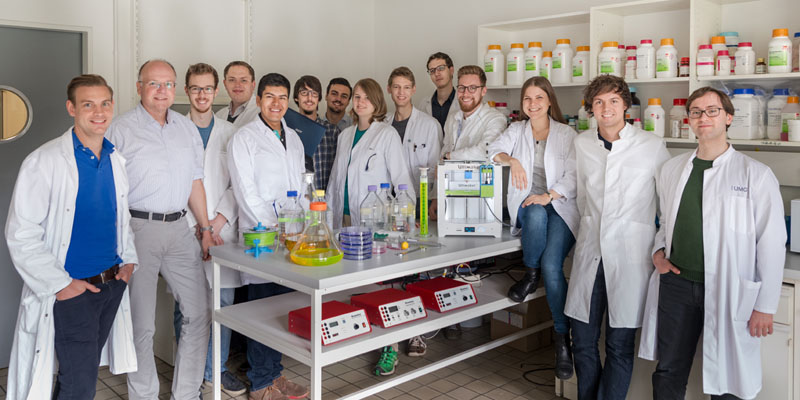Joint TUM and LMU Team Win First Prize at iGEM Competition in Boston
Manufacturing Live Tissue with a 3D Printer

The international Genetically Engineered Machine (iGEM) competition encourages students from the field of synthetic biology to implement innovative ideas and to contend with their biotechnology projects. The competition, which was initiated by the Massachusetts Institute of Technology (MIT), has been organized by the iGEM Foundation since 2003 while the MIT campus in Cambridge, MA, hosted the event until 2014. Among the 300 finalist teams this year there were twelve from Germany, including a joint team from TUM and LMU of Munich.
The 2016 iGEM project of the year, led by Professor Arne Skerra from the Chair of Biological Chemistry at TUM and sponsored by the Research Training Group GRK2062 of LMU, examined the growing problem of insufficient donor organs in transplant medicine. “The participating students from TUM and LMU developed an innovative method that should ultimately make it possible to manufacture intact tissue, and possibly even complete organs, with the help of a 3D printer,” said Professor Skerra explaining his current project group. “This breakthrough was only made possible by a combination of synthetic biology, molecular biotechnology, protein design, and technical engineering.”
3D Plastic Printer Becomes ‘3D Bioprinter’
One question the team asked was: What if the printed tissue could fulfill entirely new functions in the body, such as the production of therapeutic proteins? The printing of non-living biological material such as cartilage is already state-of-the-art. However, substantial obstacles still had to be overcome on the path to printing complex cell structures. “And this is exactly where this year's project began, in which live cells were printed into a biocompatible matrix using a 3D printer,” project head Skerra explained. For this purpose, a conventional plastic 3D printer was converted into a 3D bioprinter.
Layer by layer, biological tissue is created in this manner. In the past, hydrogels were used for such purposes — they provide a gelatinous scaffold in the first place and are populated with cells thereafter. However, the students from both Munich universities followed an alternative strategy because the ‘scaffold’ approach makes printing more complicated and the cells are held together in an unnatural manner. Instead, they developed a special bio-ink, a type of biochemical two-component resin for directly printing living cells in 3D.
The main component of this system is biotin, commonly known as vitamin H or B7, with which the surface of the cells was coated. The second component is Streptavidin, a protein that binds biotin and serves as the actual biochemical glue. In addition, bulky proteins were equipped with biotin groups to serve as cross-linker. “When a suspension of the cells is ‘printed’ into a concentrated solution of the protein components,” Professor Skerra explained, “the desired 3D structure forms.”
Hence, with this bio-ink a moldable tissue made of live cells is created in the biotINK tissue printer — more or less ready for transplantation. In light of these results, the team led by Professor Skerra and his doctoral students Andreas Reichert and Volker Morath at TUM, whose motto for the competition was “Let’s take bioprinting to the next level,” delivered what they had promised.
Already in 2013, a team led by Professor Skerra participated in the finals and won the second prize in the category "Undergraduates".
Contact
Prof. Dr. Arne Skerra
Technical University of Munich
Chair for Biological Chemistry
Tel: +49 8161 71 4350
skerra@tum.de
http://biologische-chemie.userweb.mwn.de/index.html